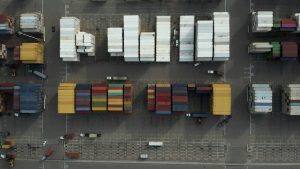Building material exporters often face challenges in recovering debts owed to them. In order to navigate this process successfully, it is important for exporters to have effective debt recovery strategies in place. This article explores various strategies that exporters can employ to recover debts, including building strong customer relationships, implementing robust credit management practices, utilizing technology, and seeking professional assistance.
Key Takeaways
- Establishing trust and credibility with customers is crucial for successful debt recovery.
- Maintaining regular communication with customers helps in managing and recovering debts.
- Offering flexible payment options can incentivize customers to make timely payments.
- Providing exceptional customer service can help in resolving payment issues amicably.
- Implementing thorough credit checks and due diligence is essential to minimize the risk of non-payment.
Understanding the Debt Recovery Process
The Importance of Debt Recovery for Building Material Exporters
Debt recovery is crucial for building material exporters to maintain financial stability and ensure business growth. It allows exporters to recover outstanding payments and minimize the impact of payment challenges in energy sector deals. By effectively managing debt recovery, exporters can protect their cash flow, maintain a positive reputation, and establish strong relationships with customers. Implementing robust debt recovery strategies is essential for exporters to navigate the complexities of the construction industry and overcome common challenges.
Common Challenges in Debt Recovery
Debt recovery for building material exporters can be a complex process, with several challenges to navigate. One common challenge is dealing with Brazilian markets, which can have unique legal and cultural considerations. Another challenge is managing communication barriers, especially when dealing with international customers. Additionally, fluctuating exchange rates and economic instability can pose challenges for debt recovery. It is important for exporters to have a clear understanding of these challenges and develop effective strategies to overcome them.
Legal Considerations in Debt Recovery
When it comes to debt recovery, building material exporters need to be aware of various legal considerations. Understanding the legal landscape is crucial for successful debt recovery strategies. One important aspect to consider is the USA-Brazil trade relationship, which can impact the recovery process. It is important to stay updated on any changes or developments in trade agreements between the two countries. Additionally, exporters should familiarize themselves with the legal requirements and regulations in both the exporting and importing countries. This includes understanding the legal framework for debt collection, dispute resolution mechanisms, and any specific laws that may apply to debt recovery in the building material industry.
Effective Strategies for Debt Recovery
Implementing effective strategies is crucial for successful debt recovery. Building material exporters can employ various tactics to improve their chances of recovering debts. These strategies include:
Building Strong Customer Relationships
Establishing Trust and Credibility
Establishing trust and credibility is essential for building material exporters. It is important to demonstrate reliability and a commitment to quality in order to gain the trust of customers. Building strong relationships with customers is key to ensuring repeat business and positive word-of-mouth recommendations. By delivering on promises and providing excellent customer service, exporters can establish themselves as trusted partners in the industry. Additionally, maintaining transparency in all business dealings and adhering to ethical practices helps to build credibility and foster long-term relationships with customers.
Maintaining Regular Communication
Regular communication with customers is essential for effective debt recovery. By staying in touch with customers, building material exporters can build trust and maintain a positive relationship. This can be achieved through various means such as phone calls, emails, and in-person meetings.
To ensure regular communication, exporters can:
- Schedule regular check-ins to discuss payment status and address any concerns or issues.
- Send friendly reminders about upcoming payment due dates.
- Provide updates on new products or promotions to keep customers engaged.
Tip: When communicating with customers, it’s important to maintain professionalism and empathy. This can help in resolving any disputes or issues amicably.
Offering Flexible Payment Options
Building material exporters can increase their chances of debt recovery by offering flexible payment options to their customers. By providing customers with a range of payment methods, such as credit cards, bank transfers, and installment plans, exporters can accommodate different financial situations and preferences. This not only makes it easier for customers to make payments but also reduces the risk of non-payment or delayed payments. Offering flexible payment options can also help exporters attract new customers and build stronger relationships with existing ones.
Providing Exceptional Customer Service
When it comes to customer service, going above and beyond is key. Here are some strategies to ensure your customers receive exceptional service:
- Prompt response: Respond to customer inquiries and concerns in a timely manner to show that their needs are a priority.
- Personalized approach: Tailor your interactions to each customer, making them feel valued and understood.
- Problem-solving mindset: Take a proactive approach to resolving issues, finding solutions that meet the customer’s needs.
- Continuous improvement: Regularly evaluate and improve your customer service processes to ensure they are efficient and effective.
Remember, providing exceptional customer service can lead to customer loyalty and positive word-of-mouth, which can ultimately contribute to your debt recovery efforts.
Implementing Robust Credit Management Practices
Thorough Credit Checks and Due Diligence
It is vital to utilize an effective third party collection partner to keep distressed accounts from becoming write-offs. Our skilled team will keep your distressed Accounts Receivable performing.
Take the first steps to getting paid:
- Licensed, Bonded and Insured
- 24/7 Online Account Access
- Fast Remittances & Electronic Payments
- Unparalleled Results and Performance
How we work:
Phase 1:
- Daily Phone Calls
- Demand Letters
- Skip Tracing
- Settlement Negotiations
- Dispute Resolution
Expect our collector to place daily phone calls, send demand letters, conduct skip tracing, negotiate settlements, and resolve disputes.
Setting Clear Credit Terms and Conditions
Setting clear credit terms and conditions is crucial for effective debt recovery. By clearly outlining the payment terms, interest rates, and penalties for late payments, building material exporters can establish a mutually agreed-upon framework that minimizes disputes and ensures timely payments. Transparency in credit terms and conditions helps build trust and credibility with customers, reducing the likelihood of payment delays or defaults.
To ensure clarity and understanding, consider using a table to present the credit terms and conditions. This table can include columns for payment due dates, applicable interest rates, and any penalties for late payments. By presenting this information in a structured format, exporters can easily communicate the expectations to their customers and avoid any confusion or misunderstandings.
Additionally, it is important to include a clear explanation of the consequences for non-compliance with the credit terms and conditions. This can include actions such as suspending further credit, imposing additional fees, or pursuing legal action if necessary. By clearly communicating the potential consequences, exporters can deter customers from defaulting on their payments and encourage timely repayment.
Monitoring and Managing Credit Limits
Monitoring and managing credit limits is crucial for building material exporters to maintain healthy financial relationships with their customers. By regularly reviewing and adjusting credit limits, exporters can ensure that they are extending credit to customers who have the ability to pay. This helps minimize the risk of non-payment and potential write-offs. Additionally, monitoring credit limits allows exporters to identify any changes in a customer’s financial situation or creditworthiness, enabling them to take proactive measures to mitigate risk. By implementing a systematic approach to credit limit management, exporters can protect their cash flow and maintain a sustainable business model.
Implementing a Collections Process
Implementing a collections process is crucial for effective debt recovery. It helps streamline the debt collection process and ensures that all outstanding payments are properly managed. Here are some key steps to consider when implementing a collections process:
- Establish clear guidelines: Clearly define the procedures and policies for debt collection, including when and how to contact customers, the escalation process, and the use of collection agencies.
- Maintain accurate records: Keep detailed records of all communication and actions taken during the collections process. This documentation can be valuable evidence in case legal action is necessary.
- Regularly review and update: Continuously evaluate the effectiveness of the collections process and make necessary adjustments to improve efficiency and success rates.
Tip: It’s important to strike a balance between assertiveness and maintaining good customer relationships. Be firm but professional in your approach to debt collection.
Utilizing Technology for Efficient Debt Recovery
Automating Invoicing and Payment Reminders
Automating the invoicing and payment reminders process can greatly improve the efficiency of debt recovery. By implementing automated systems, building material exporters can ensure timely payments from customers. This not only reduces the risk of late or missed payments but also streamlines the overall debt collection process. With automated invoicing, reminders are sent out promptly, minimizing the need for manual follow-ups. Additionally, automated systems can track payment history and send reminders at predetermined intervals, increasing the chances of successful debt recovery.
Using Customer Relationship Management (CRM) Software
Customer Relationship Management (CRM) software is a valuable tool for building material exporters in managing and organizing customer data. It allows exporters to efficiently track and analyze customer interactions, streamline communication, and improve overall customer satisfaction. With CRM software, exporters can easily access important customer information, such as contact details, purchase history, and communication logs. This enables them to personalize their approach and provide tailored solutions to meet customer needs. Additionally, CRM software can help exporters identify trends and patterns in customer behavior, allowing them to make data-driven decisions and optimize their B2B trade strategies.
Leveraging Data Analytics for Risk Assessment
Data analytics plays a crucial role in assessing the risk associated with debt recovery. By analyzing quantitative data, such as payment history, credit scores, and financial statements, building material exporters can gain valuable insights into the creditworthiness of their customers. This information helps them make informed decisions about extending credit and setting appropriate credit limits.
In addition to quantitative data, qualitative factors, such as industry trends, market conditions, and customer behavior, also contribute to risk assessment. By leveraging data analytics tools, exporters can identify patterns and trends that may indicate potential default or delinquency. This allows them to take proactive measures, such as adjusting credit terms or initiating collections processes, to mitigate the risk of non-payment.
To effectively leverage data analytics for risk assessment, building material exporters should:
- Invest in advanced data analytics software that can handle large volumes of data and provide accurate insights.
- Regularly update and maintain their data sources to ensure the accuracy and reliability of the analysis.
- Collaborate with data analysts or hire professionals with expertise in data analytics to interpret and make strategic decisions based on the findings.
By harnessing the power of data analytics, building material exporters can enhance their debt recovery strategies and minimize the financial risks associated with non-payment.
Streamlining Debt Collection Processes
Streamlining debt collection processes is crucial for building material exporters to ensure timely payment and minimize losses. By implementing efficient and automated systems, exporters can improve their cash flow and reduce the risk of overdue payments. Brazilian Debts can be particularly challenging to recover, but with the right strategies in place, exporters can increase their chances of successful debt recovery. Here are some key steps to streamline debt collection processes:
- Automate invoicing and payment reminders to ensure timely communication with customers.
- Utilize customer relationship management (CRM) software to track and manage debt collection activities.
- Leverage data analytics to assess the risk of non-payment and prioritize collection efforts.
- Implement a streamlined collections process that includes clear escalation procedures and regular follow-ups.
Remember, it is important to work with a reliable and experienced third-party collection partner to handle difficult cases and improve debt recovery outcomes. By streamlining debt collection processes, building material exporters can protect their financial stability and maintain healthy customer relationships.
Seeking Professional Assistance
Engaging Debt Collection Agencies
When faced with challenging debt recovery situations, engaging debt collection agencies can be a strategic move for building material exporters. These agencies specialize in professional debt recovery services, leveraging their expertise and resources to maximize the chances of successful debt collection. Here are some key benefits of engaging debt collection agencies:
- Specialized knowledge: Debt collection agencies have in-depth knowledge of debt recovery laws and regulations, ensuring compliance and minimizing legal risks.
- Efficient processes: With streamlined debt collection processes, agencies can handle large volumes of debt cases effectively and efficiently.
- Negotiation skills: Debt collection agencies are skilled negotiators, able to engage with debtors and explore settlement options that align with the exporter’s interests.
Tip: When engaging debt collection agencies, it is important to choose reputable and experienced agencies that have a proven track record of successful debt recovery.
Hiring Legal Counsel
When facing complex legal issues, hiring legal counsel is crucial. They have the expertise and knowledge to navigate the intricacies of debt recovery laws and regulations. Legal counsel can provide valuable advice on the best course of action to take when dealing with delinquent customers. They can also assist in drafting and reviewing legal documents, such as demand letters and settlement agreements. By partnering with experienced legal professionals, building material exporters can ensure that their debt recovery efforts are conducted in a legally sound and effective manner.
Utilizing Mediation and Arbitration Services
When faced with challenges in invoice collection, building material exporters can turn to mediation and arbitration services for resolution. These services provide a neutral and impartial platform for parties to negotiate and settle disputes. Mediation allows both parties to have a say in the outcome and encourages open communication. Arbitration, on the other hand, involves a third-party decision-maker who reviews the evidence and makes a binding decision. By utilizing these services, exporters can avoid lengthy and costly legal battles and find a mutually beneficial solution.
Exploring International Debt Recovery Solutions
When it comes to recovering debts from international clients, building material exporters can consider the following strategies:
- Engaging Debt Collection Agencies: Partnering with debt collection agencies that specialize in international debt recovery can help navigate the complexities of different legal systems and cultural norms.
- Hiring Legal Counsel: Seeking legal advice from professionals with expertise in international debt recovery can ensure compliance with relevant laws and regulations.
- Utilizing Mediation and Arbitration Services: Resolving disputes through mediation or arbitration can be a cost-effective and efficient alternative to litigation.
- Exploring International Debt Recovery Solutions: Researching and exploring specialized services and solutions specifically designed for international debt recovery can provide valuable insights and assistance in recovering debts from overseas clients.
If you’re struggling with debt and need help, seeking professional assistance can be a smart move. At Debt Collectors International, we understand the challenges of debt collection and offer simple solutions to help you get back on track. Our team of experts is dedicated to providing personalized debt collection services tailored to your specific needs. Whether you’re dealing with unpaid invoices, overdue payments, or delinquent accounts, we have the knowledge and experience to effectively recover the money you’re owed. Don’t let debt weigh you down any longer. Take the first step towards financial freedom by contacting Debt Collectors International today.
Frequently Asked Questions
What is the importance of debt recovery for building material exporters?
Debt recovery is important for building material exporters as it helps them recover unpaid invoices and maintain a healthy cash flow. It ensures that the exporter receives payment for their products and services, allowing them to continue operating and investing in their business.
What are the common challenges in debt recovery for building material exporters?
Common challenges in debt recovery for building material exporters include late payments, non-payment, disputes over quality or quantity of goods, and dealing with customers who are facing financial difficulties. These challenges can impact cash flow and profitability.
What legal considerations should building material exporters keep in mind during debt recovery?
Building material exporters should be aware of the legal framework governing debt recovery in their jurisdiction. They should understand their rights and obligations, including the use of legal remedies such as filing a lawsuit or engaging debt collection agencies. It is important to comply with applicable laws and regulations to avoid legal consequences.
What are effective strategies for debt recovery for building material exporters?
Effective strategies for debt recovery for building material exporters include building strong customer relationships, implementing robust credit management practices, utilizing technology for efficient debt recovery, and seeking professional assistance when necessary. These strategies help improve the chances of recovering outstanding debts.
How can building material exporters establish trust and credibility with their customers?
Building material exporters can establish trust and credibility by delivering high-quality products, providing excellent customer service, maintaining transparency in business transactions, and honoring commitments. Building long-term relationships based on trust is crucial for successful debt recovery.
What are some flexible payment options that building material exporters can offer?
Building material exporters can offer flexible payment options such as installment plans, trade credit, or discounts for early payment. These options provide customers with flexibility in managing their cash flow and can facilitate prompt payment.





